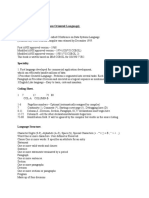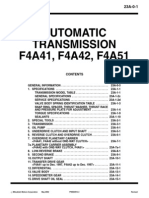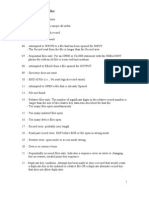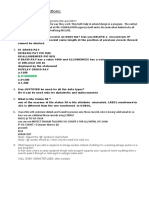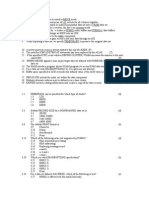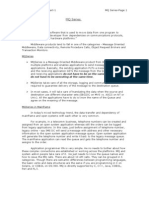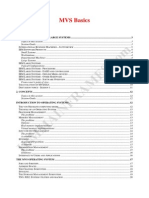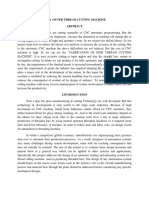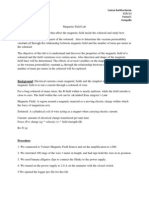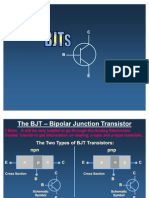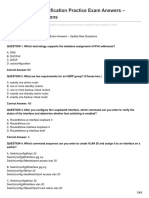JCL Abend Codes
JCL Abend Codes
Uploaded by
Snehalatha SunkireddyOriginal Description:
Original Title
Copyright
Available Formats
Share this document
Did you find this document useful?
Is this content inappropriate?
Report this DocumentCopyright:
Available Formats
JCL Abend Codes
JCL Abend Codes
Uploaded by
Snehalatha SunkireddyCopyright:
Available Formats
JCL ABEND CODES
S001
An input/output error occurred on a sequential data set.
Possible causes:
o An attempt was made to read after end-of-file.
o An attempt to open an open file.
o There was a conflict between the program, the J CL DCB, and the data set
DCB information.
o An incorrect block or record length was specified.
o An attempt was made to write to an input data set.
o There was physical damage to the recording medium.
o There was a hardware malfunction.
Solution:
o Verify that the program logic is correct.
o Compare the DCB attributes in the program with the J CL and the data set
label. Correct any inconsistencies.
o Ensure that the length of the work area for a write is the same as the FD
record length.
o Recreate the problem data set if necessary.
S013
An error occurred in opening a data set because of conflicting or
unspecified data set attributes.
Possible causes:
o There was a conflict between the program, the J CL, and the data set label
DCB information required.
o Some required DCB information was omitted.
o Directory space was not allocated for a partitioned data set.
o The BLKSIZE DCB sub-parameter was missing for a dummy data set.
o A specific member of a partitioned data set could not be located.
o For fixed block records, the LRECL=0, or the data set was empty.
o For fixed length records, the BLKSIZE was not a multiple of the LRECL.
o For variable length records, the blocksize was not four bytes greater than
the logical record length.
I
B
M
M
A
I
N
F
R
A
M
E
S
.
c
o
m
o RECFM=F was specified and the logical record length was not the same
as the block size.
Solution:
o Check the DCB attributes of the problem data set and correct any
inconsistencies. Check for inconsistencies between the program, the J CL,
and the data set DCB characteristics.
o Verify that all the DCB information required for the data set is specified.
o Recreate the partitioned data set specifying a value for directory blocks in
the space parameter.
o Specify a BLKSIZE that matches the program DCB information.
o Check the spelling for any programs to be executed.
o Verify that the appropriate STEPLIB data sets have been provided.
S002
Possible causes:
o An error occurred in processing a sequential or indexed sequential data
set, or in creating a direct access data set.
o The record being processed exceeded the allowable size.
An error occurred in reading a sequential data set.
o The variable record length was less than 4.
o The LRECL was greater than the DCB record length.
o An error occurred in sequential processing of variable length spanned
records which were not in sequence.
o In writing to a sequential or direct access data set, the record length was
greater than 32,767 bytes.
o In writing to a sequential or direct access data set, the record length was
greater than the track capacity.
o In writing to a sequential or direct access data set, the variable length
record was longer than 32,752 bytes (the data set used track overflow).
o In writing to a sequential or direct access data set, the record length
exceeded the DCB block size.
o In writing to a sequential data set with variable length records, an invalid
length field was encountered:
1. It was less than 4 (or 5 with ASA control characters)
2. It was greater than the DCB blocksize or 32,767 bytes.
o An error occurred in writing a record longer than the track capacity (the
data set did not use track overflow).
I
B
M
M
A
I
N
F
R
A
M
E
S
.
c
o
m
o An error occurred in obtaining a secondary extent, when writing to a direct
access file. There was not enough secondary space to hold the block being
written.
Other causes:
An error occurred in writing a block larger than the primary extent on the pre-
allocated direct access data set in opening a direct data set, it was determined that
the blocksize was larger than the primary extent.
An error occurred in opening an indexed sequential data set:
1. Too many tracks were requested for cylinder overflow.
2. The DCB BLKSIZE was not a multiple of the DCB LRECL.
Solution:
1. Change the J CL and/or program DCB information to be consistent with that of
the data set.
2. Recreate the data set specifying the correct DCB information.
3. Recreate the data set so that the spanned records are in the correct sequence.
4. Verify the record definition, particularly the number of occurrences in an
occurs clause.
5. If the record length exceeds the track length, specify a different device in the
unit parameter.
S03B
An error occurred in opening an indexed sequential data set.
Possible causes:
1. A write to the data set was attempted when DISP=SHR was coded in the J CL.
2. A write to the file was attempted when it was not opened for output.
3. The data set was not created or it was not closed after it was created.
4. The block sizes or logical record lengths in the program were inconsistent with
the J CL.
5. The data set was already open.
I
B
M
M
A
I
N
F
R
A
M
E
S
.
c
o
m
Solution:
1. If the data set is to be updated, ensure that DISP=OLD is specified in the J CL,
and that the data set is opened for output.
2. Ensure that the data set is closed after it is created.
3. Verify that the program is consistent with the DCB information and that the
block size is a multiple of the LRECL.
S03D
An error occurred in opening an indexed sequential or direct access data
set.
Possible causes:
1. There was a conflict between the program and the J CL data set organization.
2. The volume parameter for a multi-volume data set was incorrect.
3. Not all of the volume serial numbers of the data set were specified.
4. The volume serial numbers were specified in wrong sequence.
The DD statement did not specify indexed sequential organization.
Can open was issued for a direct access data set, but the data set had indexed
sequential organization.
Solution:
1. Ensure that the data set organization specified in the program is consistent with
the DSORG sub-parameter in the J CL.
2. Verify that all the volumes that the data set resides on are specified in the
sequence in which the data set exists.
1. For indexed sequential data sets, specify the volume containing the index first.
2. Verify that all the volumes which the data set resides on are specified in the
sequence in which the data set exists.
3. Ensure that all the requested volumes are mounted.
Specify either dsorg=is or dsorg=isu in the DCB parameter.
Determine the organization of the data set, and make the appropriate program or
J CL changes.
I
B
M
M
A
I
N
F
R
A
M
E
S
.
c
o
m
S031
An error occurred while sequentially processing an indexed sequential
data set.
Possible causes:
1. A stop run or goback was executed before a data set was closed.
2. An out-of-sequence or duplicate key was detected while loading the data set.
3. An attempt was made to write an invalid length record or block.
4. There was a hardware malfunction.
5. The recording medium was defective.
Solution
1. Change the program logic so that the data set is closed before the stop run or
goback is executed.
2. Recreate the data set ensuring that the keys are in proper sequence.
3. Be sure that the J CL LRECL is consistent with the program and data set label.
S04E
DB2 related abend. Check the messages in SYSPRINT.
Possible causes & Solution:
o Resource unavailable.
o A decimal packed field contained non-numeric data when an INSERT or
an UPDATE SQL statement was executed.
o An SQL WHERE clause in a cursor contains a packed numeric working
storage field that contains non-numeric data when the OPEN CURSOR
statement is executed. Initialize the field or remove it from the SQL
statement if not used.
S0CA
The result of an arithmetic operation was too large for the receiving field.
Possible causes & Solution:
1. An attempt was made to divide by too small of a number. 2. An attempt was
made to multiply by too large of a number.
3. A program loop containing an arithmetic instruction caused an invalid result.
I
B
M
M
A
I
N
F
R
A
M
E
S
.
c
o
m
S0CB
An invalid divide was attempted.
Possible causes & Solution:
1. The divisor was zero.
2. The quotient exceeded the allowed data field size.
1. Determine why the divisor is zero.
2. Expand the size of the dividend field, or reduce the size of the divisor field.
Note: a comp-3 field may not exceed 15 digits.
S0C1
The current machine instruction was invalid.
Possible causes & Solution:
1. A J CL DD statement was either invalid or missing.
2. An attempt was made to open a data set which was already open.
3. A read/write was attempted to an unopened data set.
4. An attempt was made to execute a subroutine which was not link edited into
the load module.
5. The select clause was invalid for an isam data set.
S0C2
Possible causes & Solution:
The current machine instruction was invalid.
1. A J CL DD statement was either invalid or missing.
2. An attempt was made to open a data set that was already open.
3. A read/write was attempted to an unopened data set.
4. The select clause in the file-control paragraph did not specify an index
sequential data set, when in fact the data set was indexed sequential.
5. A subscript or index contained an invalid value.
I
B
M
M
A
I
N
F
R
A
M
E
S
.
c
o
m
S0C4
An invalid machine address was calculated by the program.
Possible causes & Solution:
1. A subscript or index contained an invalid value.
2. A J CL DD statement was either invalid or missing.
3. The blocksize and record size were specified as equal for variable length
records.
4. An attempt was made to read/write an unopened data set.
5. An attempt was made to read after end-of-file.
6. A stop run occurred before all opened data sets were closed.
B.
In the input or output procedure of a sort.
7. An attempt was made to reference an input/output area but no open or read had
occurred for the data set.
8. Invalid parameters were passed through the linkage section.
9. The file-control select clause was missing for the data set that was being
processed.
S0C5
An invalid address was specified.
Possible causes & Solution:
1. A close statement was issued twice for the same file.
2. A procedure which was operated on by a Perform statement contained an
improper exit.
3. An attempt was made to reference an input/output area, but no open or read had
occurred for the data set.
4. A subscript or index contained an invalid value.
5. A J CL DD statement was either invalid or missing.
6. The blocksize and record size were specified as equal for variable length
records.
7. An attempt was made to read/write an unopened data set.
8. An attempt was made to read after end-of-file.9. A stop run occurred before all
opened data sets were closed.
9 In the input or output procedure of a sort.
10. Invalid parameters were passed through the linkage section.
11. The file-control select clause was missing for the data set that was being
processed.
I
B
M
M
A
I
N
F
R
A
M
E
S
.
c
o
m
S0C6
An attempt was made to execute a machine instruction which had invalid
operands.
Possible causes & Solution:
1. The program fields and/or data sets were incorrectly defined.
2. A multiplier or divisor was too large.
3. A subscript or index contained an invalid value.
4. A J CL DD statement was either invalid or missing.
5. The blocksize and record size were specified as equal for variable length
records.
6. An attempt was made read/write to an unopened data set.
7. An attempt was made to read after end-of-file.
8. A stop run occurred before all opened data sets were closed.
B.
In the input or output procedure of a sort.
9. An attempt was made to reference an input/output area, but no open or read had
occurred for the data set.
10. Invalid parameters were passed through the linkage section.
11. The file-control select clause was missing for the data set that was being
processed.
S0C7
A numeric field contained non-numeric data.
Possible causes & Solution:
1. Numeric data was not initialized.
2. A subscript or index contained an invalid value.
3. A comp-3 field had an invalid sign.
4. A group move overlaid a numeric field with non-numeric data.
S0C8
The result of an arithmetic operation was too large for the receiving field.
Possible causes & Solution:
I
B
M
M
A
I
N
F
R
A
M
E
S
.
c
o
m
1. An attempt was made to divide by too small of a number.
2. An attempt was made to multiply by too large of a number.
3. A program loop containing an arithmetic instruction caused an invalid result.
S0C9
A division gave a quotient which was too large for the program defined
field.
Possible causes & Solution:
1. An attempt was made to divide by zero.
2. An attempt was made to divide by too small of a number.
3. A program loop containing an arithmetic instruction caused an invalid result.
4. A sort operation was missing a SORTIN or SORTOUT J CL DD card.
An error occurred in end-of-volume processing on a magnetic tape volume.
1. An error occurred in header or trailer label processing.
2. An error occurred in positioning the magnetic tape.
3. The recording medium was defective.
An I/O error occurred while writing a tapemark or an end-of-volume label.
An I/O error occurred while the tape was being positioned for label processing an
I/O error occurred in reading the trailer label of an input or inout data set.
An I/O error occurred while positioning at the end of a magnetic tape volume.
An I/O error occurred in reading the header label for an input or inout data set.
An I/O error occurred while positioning for the first data record of a magnetic
tape data set.
An invalid trailer label was encountered in end-of-volume processing.
An invalid header label was encountered in end-of-volume processing.
A specific vol=ser was specified for a multi-volume output data set.
One of the volumes contained a data set whose expiration date had not yet
passed.
1. Resubmit the job specifying a different volume or device.
If this does not correct the problem, recreate the data set on a different volume or
device.
Recreate the data set on a different volume or device.
For multi-volume data sets, be sure the labeling is consistent.
1. If the label format is incorrect, recreate the data set and resubmit the job.
2. If the label appears correct, specify a different volume or device.
If there is not a tapemark after the data, recreate the data set, specifying a different
volume or device.
1. If the label format is incorrect, recreate the data set and resubmit the job.
2. If the label appears correct, specify a different volume or device.
3. For multi-volume data sets, recreate the data set, ensuring that the labeling is
consistent.
I
B
M
M
A
I
N
F
R
A
M
E
S
.
c
o
m
1. Verify that the data on the data set appears correct. If so, specify a different
volume or device, and recreate the data set.
2. If there is no data on the data set, recreate the data set, and resubmit the job.
1. If the trailer label is invalid, recreate the data set, and resubmit the job.
For multi-volume data sets, be sure that the labeling is consistent.
2. If the label appears correct, specify a different device.
If this does not correct the problem, recreate the data set on a different volume.
1. If the header label is invalid, recreate the data set, and resubmit the job.
For multi-volume data sets, be sure that the labeling is consistent.
2. If the label appears correct, specify a different device.
If this does not correct the problem, recreate the data set on a different volume.
If the correct volume was definitely specified, tell the operator that the volume is
to be used even though the expiration date has not passed.
S213
An error occurred in opening a data set on a direct access device.
Possible causes & Solution:
1. A specific data set could not be located.
2. DISP=OLD or DISP=SHR was specified for an output data set.
3. DISP=MOD was specified but the data set did not exist.
1. Ensure that the data set name and volume serial number are correct and that the
disposition of the data set is consistent with its usage.
2. If a data set is used from a preceding job step, be sure that the data set was
created and passed correctly.
S214
An error occurred in volume disposition or in tape positioning when
closing a magnetic tape data set.
Possible causes & Solution:
1. There was an invalid user label.
2. There was no tapemark following the data.
3. A hardware error occurred.
4. The recording medium was defective.
1. Verify that the label formats are correct.
If they are invalid, recreate the data set.
2. Determine if there is a tapemark following the data.
I
B
M
M
A
I
N
F
R
A
M
E
S
.
c
o
m
If not, recreate the data set.
3. Rerun the job specifying a different volume or device.
S237
An error occurred in end-of-volume processing of a magnetic tape data set.
Possible causes & Solution:
1. The block count of the tape label did not agree with that of the DCB.
One or more blocks may have been skipped during processing.
2. An incorrect volume serial number was specified in the volume parameter of
the DD statement.
3. An incorrect volume was mounted.
4. The DSN was misspelled.
1. Verify that the DSN is spelled correctly, and that the correct volume(s) are
specified and mounted. Correct any errors, and resubmit the job.
2. If all the data set information appears correct, resubmit the job specifying a
different device in the unit parameter of the J CL.
If this does not correct the error, re-create the data set.
S314
An input/output error occurred in closing a data set on a direct access device.
Possible causes:
The volume or the device was defective.
Resolution:
Rerun the job specifying another volume or device.
S322
Description: The time limit was exceeded for a job or job step.
Possible causes:
1. An endless loop occurred in the executing program.
2. The time parameter on the job card did not allow enough time for the job to
complete.
3. The time parameter on the exec card did not allow enough time for the step to
complete.
4. If the time parameter was not specified, the default time limit was exceeded.
I
B
M
M
A
I
N
F
R
A
M
E
S
.
c
o
m
Resolution:
1. Check for program errors, especially endless loops that cause the job or job step
to exceed the time limit.
2. Verify that the time limits for the given job are realistic.
If necessary, specify a longer time in the time parameter, and rerun the job.
S30A
Memory error
1. The EZTVFM file is not large enough for the report being generated.
2. You have a subscript or index that is going out-of-bounds on an table or occurs
clause .
3. A file or table size is greater than the J CL/file LRECL.
4. DCB mismatch.
S413
An error occurred in opening either a direct access or a magnetic tape data set.
1. An input/output error occurred in processing a tape data set.
2. The specified data set could not be located.
3. The label or DCB parameters were incorrect.
4. A requested device was unavailable.
1. No unit was available for mounting the volume which contained the data set
being opened.
2. The volume on the allocated unit (as specified by ser) could not be demounted
because it was either reserved or permanently resident.
The volume serial number was not specified on the DD statement for a data set
which was opened for input.
An invalid volume sequence number in the J CL specified a value greater than the
number of volumes contained on the data set.
An error occurred while opening a magnetic tape data set.
The density specified in the DEN subparameter was incompatible with the
recording density of the device allocated.
An error was caused by a subsystem interface problem.
The mass storage system did not mount the requested volume.
Tape data set sequence number was specified greater than 1, but the volume
serial number did not specify a tape data set.
1. Verify that the J CL is correct.
2. Rerun the job specifying a new volume or device.
Specify another device in the unit parameter of the DD statement. Determine how
many volumes the data set spans, and request the appropriate volume.
I
B
M
M
A
I
N
F
R
A
M
E
S
.
c
o
m
S513
An error occurred in opening two data sets on the same magnetic tape volume.
This only works with SYSOUT data sets.
1. Two data sets were assigned to the same device.
2. An open was issued for a second data set on the same tape device before the
first one was closed.
1. Verify that the J CL is correct
2. Check the file usage in the program.
S522
The wait time limit was exceeded for a job or job step.
1. The operator did not respond to a console request.
2. The program was waiting for a resource that was not available at execution
time.
3. The CPU resource was not available at execution time.
4. The user request was invalid.
1. Check with the operator to determine if there were any outstanding requests for
your job.
2. Check with the operator to determine if there were any problem jobs running at
the same time as yours.
S613
An error occurred in tape related input/output.
1. The J CL DD statement was incorrect.
2. An input/output error occurred in label processing.
3. The standard header labels were missing for an input data set.
4. There was a hardware malfunction.
An error occurred in tape positioning.
An error occurred in reading a tape label.
The tape label was invalid.
An error occurred in writing a tape label.
An error occurred in writing a tapemark after the header labels.
1. Verify that the J CL specifies the correct volume and device.
2. Verify that the volume contains standard labels.
3. Resubmit the job specifying a different volume or device.
S637
An error occurred in end-of-volume processing.
An input/output error was encountered in
1. Writing a tapemark.
I
B
M
M
A
I
N
F
R
A
M
E
S
.
c
o
m
2. Positioning the tape.
3. Reading a label.
4. Sensing for a file protection ring.
An error occurred in either:
1. Reading a tape label.
2. Writing a tapemark.
3. Positioning a tape volume. The user trailer label processing caused a tape
positioning error.
Data sets with unlike attributes were concatenated.
A tape positioning error occurred for a data set to be read backwards.
If the tape contained labels, the error occurred in positioning the labels;
otherwise, the error occurred in positioning the data. The error occurred in the
open instruction with the leave option specified.
An error occurred in tape positioning for a data set using the reread option.
An error occurred while rewinding a tape prior to verifying the volume label.
An error occurred in reading a tape volume label.
An error occurred because the tape had nonstandard labels or none at all.
An error occurred while positioning at the labels, (or if there were no labels, while
positioning at the data) of a concatenated data set.
An error occurred while positioning at the labels, (or if there were no labels, while
positioning at the data) of a data set opened with input or inout to be read forward.
An I/O error occurred in sensing for a file protection ring.
An error occurred in tape positioning following header label processing.
1. Check the J CL for any inconsistencies in the label, the vol=ser, or the dsn.
2. Rerun the job specifying another volume or device.
3. Make sure that the file protection ring is available for an output data set.
S706
A non-executable load module was requested by the program. The module did not
link edit successfully.
Link edit the offending module again, and resubmit the job.
S713
An error occurred in opening a data set on tape.
1. An attempt was made to output to the data set, before the expiration date
specified had been reached.
2. The incorrect volume was requested.
1. Verify that the correct data set and volume will be accessed.
I
B
M
M
A
I
N
F
R
A
M
E
S
.
c
o
m
S714
An error occurred in closing a tape data set.
1. An I/O error occurred while writing a trailer label or tapemark.
Rerun the job specifying another volume or device.
S722
The maximum number or output lines has been exceeded.
1. The program contained an invalid write loop.
2. The number of output lines was underestimated in the J CL.
1. Check for and fix program logic error causing a loop.
S80A
The storage needed to execute the program was not available.
1. The region parameter did not specify enough storage.
2. The region parameter was omitted, and the default storage amount was too
small to run the correct program.
3. Block sizes were increased or buffers were added, and the region size was not
increased.
4. A logic error caused excessive storage to be obtained but not freed.
1. Increase the region size.
2. Look for logic errors which may cause excessive calls to other programs or
requests for storage.
S804
The storage needed to execute the program was not available.
1. The region parameter did not specify enough storage.
2. The region parameter was omitted, and the default storage amount was too
small to run the correct program.
3. Block sizes were increased or buffers were added, and the region size was not
increased.
4. A logic error caused excessive storage to be obtained but not freed.
1. Increase the region size.
2. Look for logic errors which may cause excessive f calls to other programs
or requests for storage.
I
B
M
M
A
I
N
F
R
A
M
E
S
.
c
o
m
S806
A module requested by the program could not be found.
1. The module requested did not exist in the data sets specified in the STEPLIB or
J OBLIB.
2. A J CL STEPLIB or J OBLIB DD statement was missing or incorrect.
3. The module name was misspelled.
4. An I/O error occurred in searching for the module in the library directory.
1. Verify that the correct program is being requested.
2. Ensure that the appropriate STEPLIB or J OBLIB DD statements are in the
J CL.
3. If necessary, recreate the data set.
S813
The data set name in the J CL did not match the data set name on the tape.
1. The J CL volume serial number was wrong.
2. The data set name in the J CL was misspelled.
3. The wrong tape was mounted.
4. The incorrect data set sequence number was specified in the label parameter.
5. The data set does not exist on the magnetic tape.
Verify that the J CL is correct, and resubmit the job.
S913
An error occurred in opening a magnetic tape data set.
1. The error occurred during open or end-of-volume processing.
The data set was password protected, and a correct password was not entered.
2. The error occurred in opening a checkpoint data set which was concatenated to
a non-checkpoint data set.
1. Supply the correct password, and resubmit the job.
2. Eliminate any concatenations of checkpoint and non-checkpoint data sets.
SA13
An error occurred in opening a tape data set.
1. The file sequence number was wrong on a multi-volume tape data set.
2. The file sequence number was wrong, or it was less than that of the first data
set on the tape.
3. The volume serial number was wrong.
4. The job which wrote the tape did not write all the data sets.
1. Verify that the J CL is correct, and resubmit the job.
2. If the desired data set does not exist on the tape, recreate the tape.
I
B
M
M
A
I
N
F
R
A
M
E
S
.
c
o
m
SB37
An error occurred during end-of-volume processing of a data set.
The system was unable to fulfill a request for more space.
1. A program loop caused too many records to be written to the output data set.
2. Insufficient space was allocated to this data set in the J CL.
3. There was no more room available to receive any more output on the output
volume, and another volume could not be mounted.
1. Verify that there are no program loops or logic errors.
2. Increase the primary and/or secondary allocations for the data set.
3. Change the J CL to request that the data set be created on a volume with more
space.
SC13
An error occurred in opening a concatenated partitioned data set.
1. A concatenated data set was opened for output.
2. A data set was opened twice.
Be sure that the concatenated partitioned data set is being opened properly.
SD37
An error occurred in writing to a data set which had not been allocated enough
space.
1. A secondary allocation was not specified, and all of the primary space had been
used.
2. There was a program loop.
1. Check through the program logic for a loop.
2. Allocate more space to the data set by specifying larger primary and/or
secondary quantities in the space parameter in the J CL DD statement.
SE37
An error occurred during output to a direct access or magnetic tape data set.
1. The data set used all the space on the current volume.
2. There were not enough volumes allocated for the data set.
3. For a PDS, either all 16 extents were used, or the volume that it resided on was
filled.
4. For a multi-volume sequential data set, the data set already existed on a
subsequent volume.
I
B
M
M
A
I
N
F
R
A
M
E
S
.
c
o
m
You might also like
- Interview Questions for IBM Mainframe DevelopersFrom EverandInterview Questions for IBM Mainframe DevelopersRating: 1 out of 5 stars1/5 (1)
- Cobol (Common Business Oriented Language) : HistoryDocument54 pagesCobol (Common Business Oriented Language) : Historyrashidie_ramliNo ratings yet
- CA-idms Ads Alive User Guide 15.0Document142 pagesCA-idms Ads Alive User Guide 15.0svdonthaNo ratings yet
- Cics QuestionsDocument4 pagesCics Questionsvishalkr0078No ratings yet
- ExpditorDocument12 pagesExpditorapi-3858801100% (1)
- Commissioning ProcedureDocument3 pagesCommissioning ProcedureJonabel Lenares BorresNo ratings yet
- Canon IR 1019J - 1023 - 1023N - 1023if Service Manual IngDocument326 pagesCanon IR 1019J - 1023 - 1023N - 1023if Service Manual IngAlexanderChacon71% (7)
- F4A4x at ManualDocument135 pagesF4A4x at Manualcavp271% (7)
- RC Circuit POGIL 2020Document8 pagesRC Circuit POGIL 2020fnoschese-1No ratings yet
- DB2 11 for z/OS: Intermediate Training for Application DevelopersFrom EverandDB2 11 for z/OS: Intermediate Training for Application DevelopersNo ratings yet
- MVS JCL Utilities Quick Reference, Third EditionFrom EverandMVS JCL Utilities Quick Reference, Third EditionRating: 5 out of 5 stars5/5 (1)
- Ims-Db: Information Management System DB Concepts & ProgrammingDocument34 pagesIms-Db: Information Management System DB Concepts & ProgrammingShinoy SansilavoseNo ratings yet
- Mainframe MQ HelpDocument101 pagesMainframe MQ HelpgopaldixithtsNo ratings yet
- JCL Interview QuestionsDocument8 pagesJCL Interview QuestionsParthiban SubramanianNo ratings yet
- DB2 Interview QuestionsDocument2 pagesDB2 Interview QuestionsPrem KumarNo ratings yet
- Abend CodesDocument77 pagesAbend CodesNavneet MishraNo ratings yet
- Bind Pre CompileDocument6 pagesBind Pre CompilesamimaktarNo ratings yet
- Sort - Convert PD To ZD in Displayable Format (ZDF) : Cobol - Performance ImprovementDocument6 pagesSort - Convert PD To ZD in Displayable Format (ZDF) : Cobol - Performance ImprovementDie001No ratings yet
- VSAM Return CodesDocument9 pagesVSAM Return CodesRaghavendra VankadariNo ratings yet
- Diptesh Panda - Resume - TCSDocument4 pagesDiptesh Panda - Resume - TCSDipteshNo ratings yet
- MVS QuestionsDocument3 pagesMVS QuestionsnairarungNo ratings yet
- DB2 StoryDocument8 pagesDB2 Storyapi-3760779No ratings yet
- What's New at MAINFRAMES 360: Bulletin BoardDocument11 pagesWhat's New at MAINFRAMES 360: Bulletin BoardasimNo ratings yet
- Top 25 JCL Interview QuestionsDocument5 pagesTop 25 JCL Interview QuestionsSaurabh ChoudharyNo ratings yet
- Unit Test Report: RS203558 CPAUXREF Design RefDocument27 pagesUnit Test Report: RS203558 CPAUXREF Design Refgskn4u7183No ratings yet
- MF Interview QuestionsDocument13 pagesMF Interview QuestionsTJNo ratings yet
- Job Control Language Day 1Document53 pagesJob Control Language Day 1Sayan GuptaNo ratings yet
- IMS-DC PresentacionDocument37 pagesIMS-DC PresentacionJose Ricardo Andrade CortesNo ratings yet
- How To Convert Relational Data To XML - MelbourneDocument56 pagesHow To Convert Relational Data To XML - Melbournesp40694No ratings yet
- CicsDocument52 pagesCicsAle GomesNo ratings yet
- CICS Transaction Server V5.1 - User Experience Panel PDFDocument50 pagesCICS Transaction Server V5.1 - User Experience Panel PDFLeandro Gabriel LópezNo ratings yet
- Compile JCL and Run JCLDocument3 pagesCompile JCL and Run JCLapi-3760899No ratings yet
- Cobol Interview Question PDFDocument23 pagesCobol Interview Question PDFArpit SoniNo ratings yet
- Labguide Cobol La01 LCDocument54 pagesLabguide Cobol La01 LCRakesh OjhaNo ratings yet
- Abends All in OneDocument19 pagesAbends All in OneRammurthyNo ratings yet
- VSAM Quiz-7Document2 pagesVSAM Quiz-7Thirunarayanan SampathNo ratings yet
- VSAMDocument21 pagesVSAMMohamedSaifullahANo ratings yet
- Faqs JCLDocument11 pagesFaqs JCLkavi_aravamuthan9884No ratings yet
- DB2Document28 pagesDB2Sudarshan ShettyNo ratings yet
- DB2 QuestionnaireDocument8 pagesDB2 QuestionnaireKarthiga ManivannanNo ratings yet
- CICS Abend CodesDocument336 pagesCICS Abend Codestripati mishraNo ratings yet
- Fault AnalyserDocument173 pagesFault AnalyserNagaveni SiddappaNo ratings yet
- Db2 Faq: Db2 Questions Amit Sethi Page 1 of 49Document49 pagesDb2 Faq: Db2 Questions Amit Sethi Page 1 of 49Ravikumar VankadaraNo ratings yet
- DB2 ExplainDocument7 pagesDB2 ExplainPendyala SrinivasNo ratings yet
- Abends CicsDocument14 pagesAbends CicsVagner Rodrigues de LimaNo ratings yet
- Basic AssemblerDocument39 pagesBasic AssemblerJimmyMedinaNo ratings yet
- MQ Series: Do Not Have To Be Executing at The Same TimeDocument10 pagesMQ Series: Do Not Have To Be Executing at The Same TimeSanjay DasNo ratings yet
- Ims DBDocument132 pagesIms DBJose Ricardo Andrade Cortes100% (1)
- STROBE DB2 Feature, Form Number STF004Document58 pagesSTROBE DB2 Feature, Form Number STF004sati1987No ratings yet
- JCL Example Sample Reference CodeDocument25 pagesJCL Example Sample Reference CodeJasiekNo ratings yet
- Mat ImsDocument96 pagesMat Imsvijay reddyNo ratings yet
- Converting JCL 2 REXXDocument15 pagesConverting JCL 2 REXXsuzeet1No ratings yet
- DB2 Unit 2Document33 pagesDB2 Unit 2Anonymous 7r2OlOFVNo ratings yet
- Db2 Standards, Tips & GuidelinesDocument18 pagesDb2 Standards, Tips & Guidelinessardark2No ratings yet
- Abend-AID User Reference Guide Rel 9.2Document257 pagesAbend-AID User Reference Guide Rel 9.2svdonthaNo ratings yet
- DB2 SQL Error Code and DescriptionDocument29 pagesDB2 SQL Error Code and DescriptionpratapkumarpanigrahiNo ratings yet
- CA7Document2 pagesCA7Rajesh_Dash_2386No ratings yet
- Static and Dynamic CallDocument19 pagesStatic and Dynamic CallThrinadh Kiran KumarNo ratings yet
- Lift and Shift' Mainframe Migration To Windows: Vice President of Product Management Micro FocusDocument30 pagesLift and Shift' Mainframe Migration To Windows: Vice President of Product Management Micro FocusAntony100% (1)
- Pli QaDocument41 pagesPli Qasatishms10100% (3)
- What Is Endevor?Document27 pagesWhat Is Endevor?VidyaNo ratings yet
- What Is EndevorDocument45 pagesWhat Is EndevorSnehalatha SunkireddyNo ratings yet
- Option Ucc7: Ca-7 Logon/LogoffDocument23 pagesOption Ucc7: Ca-7 Logon/LogoffSnehalatha SunkireddyNo ratings yet
- MVS BasicsDocument35 pagesMVS BasicsSnehalatha SunkireddyNo ratings yet
- CA7 SchedulingDocument9 pagesCA7 SchedulingSnehalatha SunkireddyNo ratings yet
- Ispf/Pdf A Command: AppendixDocument10 pagesIspf/Pdf A Command: AppendixSnehalatha SunkireddyNo ratings yet
- Ca 7Document7 pagesCa 7Snehalatha SunkireddyNo ratings yet
- File Status CodesDocument3 pagesFile Status CodesSnehalatha SunkireddyNo ratings yet
- Semi - Outer Thread Cutting MachineDocument4 pagesSemi - Outer Thread Cutting MachineTechnico TechnocratsNo ratings yet
- Traffic SignalDocument25 pagesTraffic Signalpriyanka harishNo ratings yet
- EMC Symcli CommandDocument1 pageEMC Symcli CommandDnyaneshwar RepaleNo ratings yet
- Ruane UTDocument81 pagesRuane UTJindarat KasemsooksakulNo ratings yet
- Magnetic Field LabDocument5 pagesMagnetic Field LabEamon BarkhordarianNo ratings yet
- 25.application of Logic GatesDocument12 pages25.application of Logic GatesXue Wenn100% (1)
- Cursor 87 Ent m38.10Document188 pagesCursor 87 Ent m38.10jvega_534120No ratings yet
- TheodoliteDocument15 pagesTheodoliteMalvin MajidunNo ratings yet
- SCADADocument23 pagesSCADAMuthusamy ArumugamNo ratings yet
- Preparing The Philippines For The Fourth Industrial Revolution: A Scoping StudyDocument110 pagesPreparing The Philippines For The Fourth Industrial Revolution: A Scoping StudyFitz BaniquedNo ratings yet
- PLC File 2Document135 pagesPLC File 2vatsalNo ratings yet
- Limited Edition Limited Edition Limited EdDocument4 pagesLimited Edition Limited Edition Limited EdWiNo ratings yet
- Digital Logic FamiliesDocument26 pagesDigital Logic FamiliessatheeshNo ratings yet
- The Difference Between Bonding Grounding and EarthingDocument13 pagesThe Difference Between Bonding Grounding and EarthingStrike TerminalNo ratings yet
- Pro Cav450 4.en GBDocument1 pagePro Cav450 4.en GBBao Quoc MaiNo ratings yet
- BjtsDocument12 pagesBjtsRckstar RakeshNo ratings yet
- Questions&AnswersDocument25 pagesQuestions&AnswersSenthiaathavan90% (10)
- Service Manual Z8Document41 pagesService Manual Z8YitchNo ratings yet
- Inspection and Test Plan: Project NameDocument2 pagesInspection and Test Plan: Project NameehteshamNo ratings yet
- The Path To 5G in Australia 03 August 2018 2Document28 pagesThe Path To 5G in Australia 03 August 2018 2a_sahai100% (2)
- 42LN5400 Spec Sheet TV LG 42 Inch PDFDocument2 pages42LN5400 Spec Sheet TV LG 42 Inch PDFjoel0% (1)
- GLC 2200Document22 pagesGLC 2200uki12345No ratings yet
- CCNA 200-125 Certification Practice Exam Answers Update New QuestionsDocument49 pagesCCNA 200-125 Certification Practice Exam Answers Update New Questionssiddig02No ratings yet
- Pioneer DDJ-RX rrv4642 DJ ControllerDocument22 pagesPioneer DDJ-RX rrv4642 DJ Controllerpablobcasino1No ratings yet
- Optimized Panel Design Schematics: 13.8Kv Automatic Capacitor Control System (+ACCS)Document54 pagesOptimized Panel Design Schematics: 13.8Kv Automatic Capacitor Control System (+ACCS)Anonymous dH3DIEtzNo ratings yet
- Lab ReportDocument14 pagesLab Reportvishal kumarNo ratings yet


